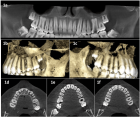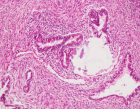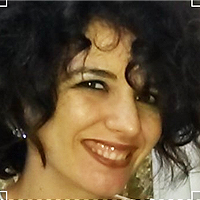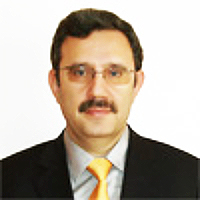Abstract
Review Article
The role of islamic lifestyle and healthy nutrition in accordance with the recommendations of islam and the holly quran by focusing on the risk of cancer incident
Roya Dolatkhah*, Pooneh Jabbaripour, Mohammad Hossein Somi and Ali Roshani
Published: 17 November, 2020 | Volume 1 - Issue 1 | Pages: 018-022
Background: The Islamic religion has emphasized the importance of health and well-being, and Muslims have recognized the value of a good and healthy life based on Islamic recommendations. Health-oriented lifestyle is a multi-dimensional phenomenon that is the purpose of this study to investigate the Islamic lifestyle.
Methods: In this review study, we tried to explore practical strategies in Islam through access to credible sources in the form of a descriptive article on achieving a healthy lifestyle in nutrition. For this purpose, using keywords and electronic and manual searches in authentic Islamic and medical sources, information was searched and collected to answer the research question.
Results: Based on the results of the reviewed studies, the guidelines of Islamic religion and beliefs are mainly based on improving lifestyle factors and dietary habits. It has been emphasized that adherence to the Islamic dietary guidelines and lifestyle, may lead to less risk of diseases.
Conclusion: Given the availability of valuable nutritional resources and instructions in Islam to prevent and combat nutrition-related diseases, these theories can be applied and prevent from spreading and creating malnutrition-related diseases; the guidelines of Islam on healthy lifestyles in nutrition can be recommended to the world as a basic strategy
Read Full Article HTML DOI: 10.29328/journal.jcmhs.1001002 Cite this Article Read Full Article PDF
Keywords:
Qur’an; Islam; Lifestyle; Nutrition; Cancer
References
- Dalvandi A, Maddah SSB, Khankeh H, Parvaneh S, Bahrami F, et al. The Health-Oriented Lifestyle in Islamic Culture. J Qualitative Res Health Sci. 2013; 1: 332-343.
- Hekari D, Mohammadzadeh R, Khajavikia H, Zarei S. Comparing lifestyle between menopause women with and without coronary heart diseases during 2010-2011. Med Sci. 2012; 22: 69-77
- Baguley BJ, Skinner TL, Jenkins DG, Wright ORL. Mediterranean-style dietary pattern improves cancer-related fatigue and quality of life in men with prostate cancer treated with androgen deprivation therapy: A pilot randomised control trial. Clin Nutr. 2020. PubMed: https://pubmed.ncbi.nlm.nih.gov/32534948/
- Cho YU, Lee BG, Kim SH. Coping style at diagnosis and its association with subsequent health-related quality of life in women with breast cancer: A 3-year follow-up study. Eur J Oncol Nurs. PubMed: 2020; 45: 101726. https://pubmed.ncbi.nlm.nih.gov/32155584/
- Tsugane S. Digestive system cancer:annual trends and associations with life-style factors. Nihon Shokakibyo Gakkai Zasshi. 2020; PubMed: 117: 359-364. https://pubmed.ncbi.nlm.nih.gov/32389907/
- Ghadimi R, Kamrani MS, Zarghami A, Darzi AA. The Role Of Nutrition In Educational And Spiritual Development Of Human Beings: Quranic Perspective. J Babol Univer Med Sci. 2013; 15.
- Tarighat-Esfanjani A, Namazi N. Nutritional Concepts and Frequency of Foodstuffs Mentioned in the Holy Quran. J Relig Health. 2016; 55: 812-819. PubMed:https://pubmed.ncbi.nlm.nih.gov/27025222/
- Chung LMY, Chung JWY, Chan APC. Building Healthy Eating Knowledge and Behavior: An Evaluation of Nutrition Education in a Skill Training Course for Construction Apprentices. Int J Environ Res Public Health. 2019; 16: 4852. PubMed: https://pubmed.ncbi.nlm.nih.gov/31810334/
- Hecht AA, Pollack Porter KM, Turner L. Impact of The Community Eligibility Provision of the Healthy, Hunger-Free Kids Act on Student Nutrition, Behavior, and Academic Outcomes: 2011-2019. Am J Public Health. 2020; 110: 1405-1410. PubMed: https://pubmed.ncbi.nlm.nih.gov/32584590/
- Hecht EM, Layton MR, Abrams GA, Rabil AM, Landy DC. Healthy Behavior Adherence: The National Health and Nutrition Examination Survey, 2005-2016. Am J Prev Med. 2020; 59: 270-273. PubMed: https://pubmed.ncbi.nlm.nih.gov/32340777/
- Shalchi V. Coffee Shop Youth Lifestyle. Iranian J Cultural Res. 2008; 1.
- Estaji Z, Akbarzadeh R, Tadayyonfar M, Rahnama F, Zardouz H, et al. Study Of The Life Style Of People In Sabzevar, Iran. J Sabzevar Univer Med Sci. 2006; 13.
- Kebbe M, Perez A, Buchholz A, Scott SD, McHugh TF, et al. Health care providers' weight management practices for adolescent obesity and alignment with clinical practice guidelines: a multi-centre, qualitative study. BMC Health Serv Res. 2020; 20: 850.
- Kebbe M, Perez A, Buchholz A, McHugh TF, Scott SD, et al. End-user perspectives to inform policy and program decisions: a qualitative and quantitative content analysis of lifestyle treatment recommendations by adolescents with obesity. BMC Pediatr. 2019; 19: 418. PubMed: https://pubmed.ncbi.nlm.nih.gov/31699060/
- Bhardwaj S, Misra A, Gulati S, Anoop S, Kamal VK, et al. A randomized controlled trial to evaluate the effects of high Protein Complete (lActo) VEgetaRian (PACER) diet in non-diabetic obese Asian Indians in North India. Heliyon. 2017; 3: e00472. PubMed: https://pubmed.ncbi.nlm.nih.gov/29387815/
- Milte CM, Ball K, Crawford D, McNaughton SA. Diet quality and cognitive function in mid-aged and older men and women. BMC Geriatr. 2019; 19: 361. PubMed: https://pubmed.ncbi.nlm.nih.gov/31864295/
- Milte CM, Thorpe MG, Crawford D, Ball K, McNaughton SA. Associations of diet quality with health-related quality of life in older Australian men and women. Exp Gerontol. 2015; 64: 8-16. PubMed: https://pubmed.ncbi.nlm.nih.gov/25639944/
- Ghanei M, Ahmady K, Babaei M, Tavana AM, Bahadori M, et al. Knowledge of healthy lifestyle in Iran: a systematic review. Electron Physician 2016; 8: 2199-2207. PubMed: https://www.ncbi.nlm.nih.gov/pmc/articles/PMC4844489/
- Mouodi S, Hosseini SR, Ghadimi R, Cumming RG, Bijani A, et al. Lifestyle Interventions to Promote Healthy Nutrition and Physical Activity in Middle-Age (40-60 Years) Adults: A Randomized Controlled Trial in the North of Iran. J Res Health Sci. 2019; 19: e00434. PubMed: https://pubmed.ncbi.nlm.nih.gov/31133624/
- Grasgruber P, Hrazdira E, Sebera M, Kalina T. Cancer Incidence in Europe: An Ecological Analysis of Nutritional and Other Environmental Factors. Front Oncol. 2018; 8: 151. PubMed: https://pubmed.ncbi.nlm.nih.gov/29951370/
- Dolatkhah R, Somi MH, Bonyadi MJ, Asvadi Kermani I, Farassati F, et al, Colorectal cancer in iran: molecular epidemiology and screening strategies. J Cancer Epidemiol. 2015; 2015: 643020. PubMed: https://pubmed.ncbi.nlm.nih.gov/25685149/
- Dolatkhah R, Somi MH, Kermani IA, Ghojazadeh M, Jafarabadi MA, et al. Increased colorectal cancer incidence in Iran: a systematic review and meta-analysis. BMC Public Health. 2015; 15: 997. PubMed: https://pubmed.ncbi.nlm.nih.gov/26423906/
- The Right Path to Health, Health Education through Religion Health Promotion through Islamic Lifestyles The Amman Declaration. In. World Health Organization (WHO).
- Grace C. Nutrition-related health management in a Bangladeshi community. Proc Nutr Soc. 2011; 70: 129-134. PubMed: https://pubmed.ncbi.nlm.nih.gov/21144124/
- Khan S, Saeed Z, Diwan HH, Hussain I, Amer S, et al. Nutritional guidelines for school lunch programs: a survey of islamic schools and recommendations for creating a culture of healthful eating. J IMA. 2011; 43: 48-57. PubMed: https://pubmed.ncbi.nlm.nih.gov/23610485/
- Ghaffari F. Healthy Nutrition from the Perspective of the Holy Quran. ZUMS J. 2014; 22: 97-109.
- Book fields of health, Publisher Ministry of Health. 2000.
- Padela AI, Zaidi D. The Islamic tradition and health inequities: A preliminary conceptual model based on a systematic literature review of Muslim health-care disparities. Avicenna J Med. 2018; 8: 1-13. PubMed: https://pubmed.ncbi.nlm.nih.gov/29404267/
- Yousefi Rizi H, Shirani M. Promotion of the occupational Health and safety culture based on Islamic teachings. 2011.
- Suthar AB, Allen LG, Cifuentes S, Dye C, Nagata JM. Lessons learnt from implementation of the International Health Regulations: a systematic review. Bull World Health Organ. 2018; 96: 110-121E. PubMed: https://pubmed.ncbi.nlm.nih.gov/29403114/
- Kluge H, Martin-Moreno JM, Emiroglu N, Rodier G, Kelley E, et al. Strengthening global health security by embedding the International Health Regulations requirements into national health systems. BMJ Glob Health. 2018; 3: e000656.
- Tabatabaei M. Qur’an and its Interpretation. In: Sunan al-Nabi. edn.; 2000: 113.
- Jfrbn: Misbah al-Sharia. 1400: 77.
- Hashemi Khoi MH. Albrah Minhaj Fi Sharh Nahj al-Balagha. 2018; 1400.
- Marcotrigiano V, Lanzilotti C, Rondinone D, De Giglio O, Caggiano G, et al. Food labelling: Regulations and Public Health implications. Ann Ig 2018; 30: 220-228. PubMed: https://pubmed.ncbi.nlm.nih.gov/29670991/
- Khomeini R. Ministry of Culture and Islamic Guidance. 2018: 326.
- Hemmati A. Green living, green feed. 1380: 41-42.
- Mohammad-ibn-Zakariyya Al-Razy A-hA-T. Publications of encyclopedia of Islamabad. 23.
- Ardshyrlaryjany M, Zahedi F. Ramadan fasting and diabetes. 1999; 18: 313-320.
- Yarmohammadi-Samani P. Quran and Healthy nutrition. 2013: 24-30.
Figures:
Similar Articles
-
The role of islamic lifestyle and healthy nutrition in accordance with the recommendations of islam and the holly quran by focusing on the risk of cancer incidentRoya Dolatkhah*,Pooneh Jabbaripour,Mohammad Hossein Somi,Ali Roshani. The role of islamic lifestyle and healthy nutrition in accordance with the recommendations of islam and the holly quran by focusing on the risk of cancer incident. . 2020 doi: 10.29328/journal.jcmhs.1001002; 1: 018-022
-
Neo communicable disease rather than ‘non’ communicable disease for the acronym “NCD”APR Aluwihare*. Neo communicable disease rather than ‘non’ communicable disease for the acronym “NCD”. . 2021 doi: 10.29328/journal.jcmhs.1001009; 2: 014-014
-
Factors influencing referral delay of cancer patients to an oncology unit in the Southern Region of Saudi ArabiaAli M Al Zahrani*,Hatim M Ali,Shaza A Ahmed,Ahmed M Abdelakher,Asma A Al Zahrani,Hatoon Bakhribah. Factors influencing referral delay of cancer patients to an oncology unit in the Southern Region of Saudi Arabia. . 2021 doi: 10.29328/journal.jcmhs.1001012; 2: 025-030
-
The effects of religiosity and knowledge on the perceptions and attitude of muslim doctors that influence the intentions that impact on behavior in using halal drugs in IndonesiaAmalia Tri Utami*,Wahidmurni,Muhammad Walid. The effects of religiosity and knowledge on the perceptions and attitude of muslim doctors that influence the intentions that impact on behavior in using halal drugs in Indonesia. . 2022 doi: 10.29328/journal.jcmhs.1001016; 3: 021-026
-
Causal Mediation Analysis for Childhood Cancer Survival Disparity in Texas, 2005 to 2014Niaz Morshed*, Russell Weaver and F Benjamin Zhan. Causal Mediation Analysis for Childhood Cancer Survival Disparity in Texas, 2005 to 2014. . 2024 doi: 10.29328/journal.jcmhs.1001044; 5: 023-030
-
Prevalence of Risk factors of Non Communicable Diseases amongst Medical Students, Kanpur, Uttar Pradesh, IndiaLakshmi Singh*, Anju Gahlot, Atul Kumar Singh. Prevalence of Risk factors of Non Communicable Diseases amongst Medical Students, Kanpur, Uttar Pradesh, India. . 2024 doi: 10.29328/journal.jcmhs.1001048; 5: 057-061
Recently Viewed
-
Treatment Outcome in Patients with Myofascial Orofacial Pain: A Randomized Clinical TrialAnders Wänman*, Susanna Marklund, Negin Yekkalam. Treatment Outcome in Patients with Myofascial Orofacial Pain: A Randomized Clinical Trial. J Oral Health Craniofac Sci. 2024: doi: 10.29328/journal.johcs.1001046; 9: 001-008
-
Hygiene and Care Protocols for Implant-supported Dental Prostheses in Patients with DiabetesHakob Khachatryan, Emma Boshnaghyan, Sevak Papoyan, Gagik Hakobyan*. Hygiene and Care Protocols for Implant-supported Dental Prostheses in Patients with Diabetes. J Oral Health Craniofac Sci. 2024: doi: 10.29328/journal.johcs.1001047; 9: 009-014
-
Advancing Oral Health and Craniofacial Science through Microchip ImplantsShekufeh Shafeie*. Advancing Oral Health and Craniofacial Science through Microchip Implants. J Oral Health Craniofac Sci. 2024: doi: 10.29328/journal.johcs.1001048; 9: 015-018
-
Texture Analysis of Hard Tissue Changes after Sinus Lift Surgery with Allograft and XenograftMohammad Azimzadeh, Farzad Esmaeili, Narges Bayat, Kasra Rahimipour, Amir Ebrahimpour Tolouei*. Texture Analysis of Hard Tissue Changes after Sinus Lift Surgery with Allograft and Xenograft. J Oral Health Craniofac Sci. 2024: doi: 10.29328/journal.johcs.1001049; 9: 019-022
-
Awareness and Knowledge of Specialists/Trainers and General Dental Practitioners about Medical-Related Osteonecrosis of the JawsAbdulhamit Taha Koca,Mustafa Bayhan,Yunus Ayberk Demir,Ayse Zeynep Zengin*. Awareness and Knowledge of Specialists/Trainers and General Dental Practitioners about Medical-Related Osteonecrosis of the Jaws. J Oral Health Craniofac Sci. 2024: doi: 10.29328/journal.johcs.1001050; 9: 023-031
Most Viewed
-
Evaluation of Biostimulants Based on Recovered Protein Hydrolysates from Animal By-products as Plant Growth EnhancersH Pérez-Aguilar*, M Lacruz-Asaro, F Arán-Ais. Evaluation of Biostimulants Based on Recovered Protein Hydrolysates from Animal By-products as Plant Growth Enhancers. J Plant Sci Phytopathol. 2023 doi: 10.29328/journal.jpsp.1001104; 7: 042-047
-
Sinonasal Myxoma Extending into the Orbit in a 4-Year Old: A Case PresentationJulian A Purrinos*, Ramzi Younis. Sinonasal Myxoma Extending into the Orbit in a 4-Year Old: A Case Presentation. Arch Case Rep. 2024 doi: 10.29328/journal.acr.1001099; 8: 075-077
-
Feasibility study of magnetic sensing for detecting single-neuron action potentialsDenis Tonini,Kai Wu,Renata Saha,Jian-Ping Wang*. Feasibility study of magnetic sensing for detecting single-neuron action potentials. Ann Biomed Sci Eng. 2022 doi: 10.29328/journal.abse.1001018; 6: 019-029
-
Pediatric Dysgerminoma: Unveiling a Rare Ovarian TumorFaten Limaiem*, Khalil Saffar, Ahmed Halouani. Pediatric Dysgerminoma: Unveiling a Rare Ovarian Tumor. Arch Case Rep. 2024 doi: 10.29328/journal.acr.1001087; 8: 010-013
-
Physical activity can change the physiological and psychological circumstances during COVID-19 pandemic: A narrative reviewKhashayar Maroufi*. Physical activity can change the physiological and psychological circumstances during COVID-19 pandemic: A narrative review. J Sports Med Ther. 2021 doi: 10.29328/journal.jsmt.1001051; 6: 001-007

HSPI: We're glad you're here. Please click "create a new Query" if you are a new visitor to our website and need further information from us.
If you are already a member of our network and need to keep track of any developments regarding a question you have already submitted, click "take me to my Query."
















































































































































